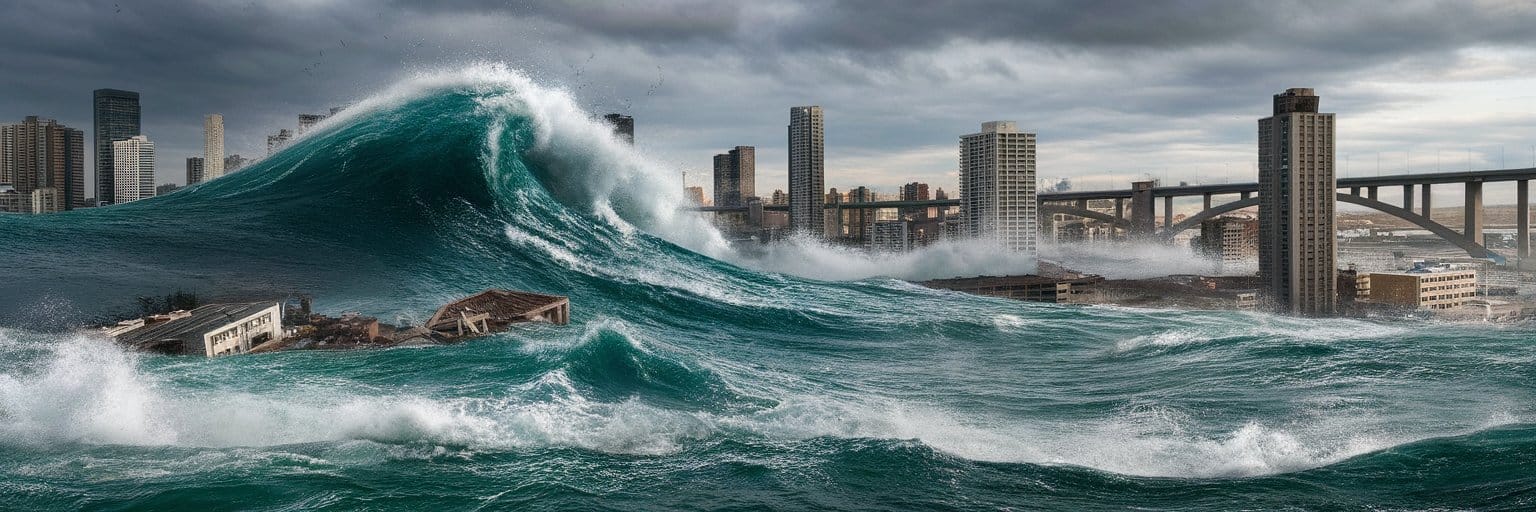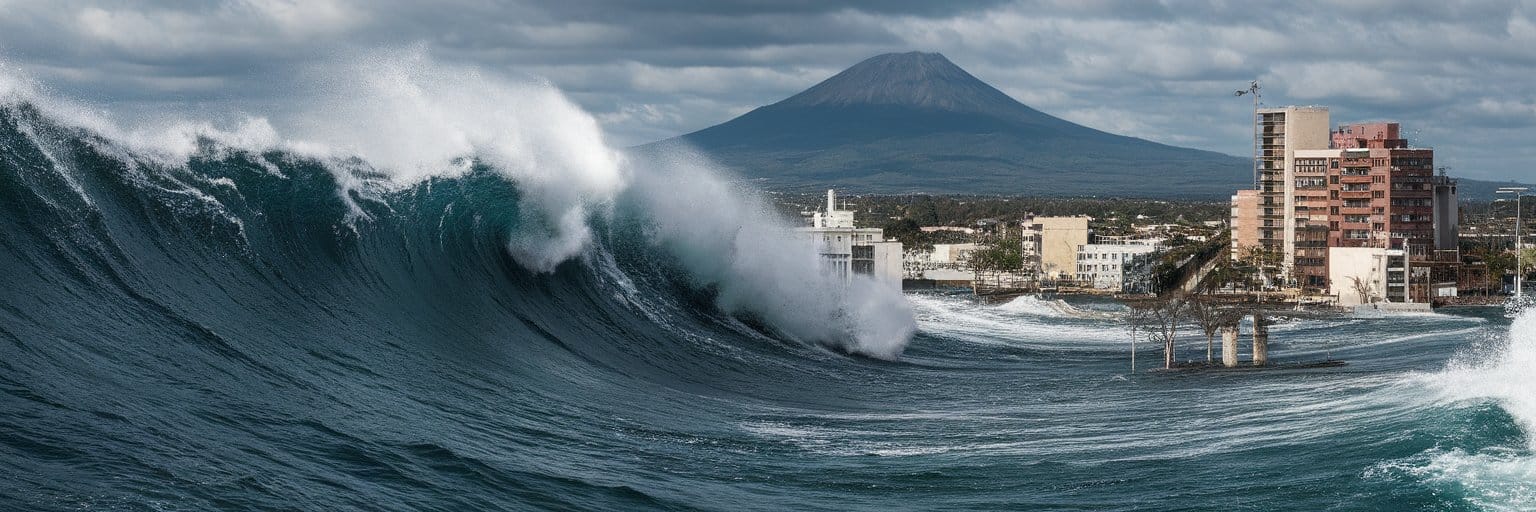Tsunami in a Dream: Unraveling the Hidden Meanings

Imagine yourself standing on the shoreline, witnessing the sea retreat far beyond its usual reach. A distant roar grows louder, and suddenly, a massive wall of water surges towards you, an unstoppable force of nature. The sheer power and unpredictability of a tsunami make it a mesmerizing and terrifying dream symbol. Experiencing a tsunami in a dream can leave you feeling shaken, yet deeply curious about what it might reveal about your inner self. Dreams are windows to our subconscious, and tsunamis have surfaced in dreams across cultures and epochs, embodying both destruction and transformation.

Overview
Experiencing a tsunami in a dream is not just about facing a natural disaster; it is an extraordinary vehicle through which our deepest fears, anxieties, and desires might manifest. To understand this complex imagery, we delve deep into its many layers: symbolic, spiritual, psychological, and even biological aspects. The transformative power of a tsunami in dreams suggests a sweeping change, an emotional upheaval, or a cleansing.
The Symbolic and Spiritual Significance of Experiencing a Tsunami
In the realm of symbolism, water often signifies emotion, the unconscious, and the flow of life itself. When transformed into a tsunami, this element symbolizes overwhelming emotions or situations that are beyond one’s control. A tsunami in a dream can herald an impending change or emotional surge. Its spiritual significance lies in its capacity to erase old structures and facilitate the creation of new ones. It serves as a powerful metaphor for personal transformation.
In various cultures, water is deeply connected to intuition and consciousness. A tsunami might symbolize intuitive insights overwhelming the rational mind, urging the dreamer to pay heed to their inner voice. In Hindu philosophy, water—and by extension, a tsunami—relates to the flow of time and space, associated with creation and destruction, reflecting the cyclical nature of life and the universe.
What Do Different Experiencing a Tsunami Scenarios Mean?
Each tsunami dream comes with its own narrative—distinct and personal. Consider these scenarios:
- Observing a Tsunami from Afar: This could suggest an awareness of a coming change or emotional wave in your waking life. It may not be imminent, but the subconscious is signaling you to be prepared.
- Caught in the Wave: A feeling of being overwhelmed or losing control is highlighted here. Perhaps there are aspects of your life causing stress or anxiety, demanding attention and resolution.
- Surviving a Tsunami: This scenario often represents resilience and the capacity for renewal. The dreamer may be enduring a tough period but possesses inner strength to withstand adversity.
- Tsunami Recurring: Recurrence might signify unresolved emotions or situations. It nudges the dreamer to take action, face fears, or seek closure in areas causing disturbance.
If you saw rain in a dream you can read our dream interpret.
Psychological Interpretations of Experiencing a Tsunami
From a Freudian standpoint, experiencing a tsunami is likely an expression of repressed emotions. Tsunamis, representing vast reservoirs of emotions, might indicate unresolved subconscious feelings, especially those linked to primal instincts of fear or desire.
Jungian interpretation, however, views tsunami dreams as manifestations of the collective unconscious. These dreams signify archetypal energies demanding integration within the psyche. They urge the dreamer to reconcile inner conflicts and harmonize disparate parts of the self.

Reiki philosophy, with its focus on energy flow, may view a tsunami dream as indicative of an energy imbalance. Such dreams could imply a blockage or overflow within the individual’s energy field, urging realignment.
Common Causes and Factors Behind Experiencing a Tsunami
The tsunami dream is often linked to stress, looming changes, or unresolved life conflicts. Life transitions like a career change, relationship dynamics, or significant personal decisions can trigger such dreams. Feelings of helplessness, jealousy, or significant loss may manifest as a tsunami within dreams.
Moreover, the dreamer’s state of health—both mental and physical—can also play a role. Those under duress, dealing with anxiety or disorders, might see these dramatic dreams as reflections of their wakeful stressors.
Scientific Explanations for Experiencing a Tsunami in Dreams
Scientifically, dreams are understood through the neural and cognitive lenses. Dreams often compile ideas, perceptions, or stressors gathered throughout the day. A tsunami dream, then, might result from stress-related neurons firing erratically during dreams.

Sleep disturbances or physical cues (such as the sensation of sweating or rapid breathing during REM sleep) can create vivid dream experiences like tsunamis. Neurological studies suggest that these dramatic dreams might serve as a psychological mechanism to process fears or worrisome thoughts.
Coping Strategies for Experiencing a Tsunami in Dreams
Understanding and managing these dreams involves adopting coping strategies. Keeping a dream journal can aid in identifying patterns or triggers. Regular meditation or mindfulness practices can help process emotions and diminish stress.
Professional counseling or therapy offers a space to explore underlying issues contributing to compelling dreams. Moreover, cultivating healthy sleep habits can improve sleep quality and reduce unsettling dreams.
Summary & Final Thoughts
In essence, experiencing a tsunami in a dream is a rich tapestry of meaning and insight. It calls attention to emotions and changes, both known and repressed, urging growth and transformation. Such dreams invite introspection and self-awareness, offering a glimpse into the deeper undercurrents of our psyche. Consider, then, what tidal emotions or changes your dreams suggest. Reflect and welcome the opportunity for transformation, harnessing the power of dreams to navigate your waking life.
FAQ: Decoding the Symbolism of Tsunami Dreams
What is the spiritual meaning of experiencing a tsunami in a dream?
Experiencing a tsunami in a dream often signifies overwhelming emotions, situations beyond your control, or significant changes. Spiritually, it can suggest the need for a personal transformation, serving as a symbolic 'clearing out' of old habits or structures to make way for new paths.
How is water symbolically significant in tsunami dreams?
In dream symbolism, water often represents emotions, unconscious thoughts, or the flow of life. In the form of a tsunami, it can symbolize out-of-control emotions or events, heralding dramatic changes or emotional surges. It can also connect to intuition and spiritual insight.
What are common tsunami dream scenarios and their meanings?
- Observing a Tsunami from a Distance: Reflects awareness of impending changes or emotional upheaval, suggesting a need for preparation.
- Caught in a Tsunami's Wave: Symbolizes feelings of being overwhelmed or powerless, indicating stress or anxiety that needs addressing.
- Surviving a Tsunami: Represents resilience and renewal, reflecting inner strength in adversity.
- Experiencing Recurring Tsunamis: Suggest unresolved emotions, prompting action towards resolution.
How are tsunami dreams interpreted psychologically?
From a psychological perspective:
- Freudian Analysis: Tsunami dreams might indicate repressed emotions, symbolizing unresolved fears or desires.
- Jungian Perspective: Jung might interpret these dreams as manifestations of the collective unconscious, urging reconciliation of inner conflicts.
- Reiki Point of View: Dreams of tsunamis could symbolize energy imbalances needing realignment and healing.
What causes dreams about tsunamis?
Triggers for tsunami dreams can include high stress, impending life changes, life transitions like career shifts or relationship changes, and significant personal decisions. Both mental and physical health can influence these dreams, highlighting the need to deal with waking life stressors.
What scientific explanations exist for tsunami dreams?
From a scientific perspective, dreams often compile daily stresses and ideas, with anomalies like tsunamis reflecting emotional or mental tension. The body's physiological reactions and brain activity during REM sleep can influence the vividness and content of these dreams.
What coping strategies are recommended for tsunami dreams?
Coping strategies might include keeping a dream journal for pattern recognition, practicing mindfulness techniques for stress reduction, seeking professional counseling for personal insights, and maintaining a healthy sleep routine for improved sleep quality.
What insights do tsunami dreams offer?
Tsunami dreams offer profound insights into your emotional landscape, personal changes, and subconscious fears. They invite introspection, self-awareness, and personal growth, encouraging you to address underlying emotions and navigate life changes. Understanding these dreams can harness the transformative potential of seemingly chaotic dream experiences.




